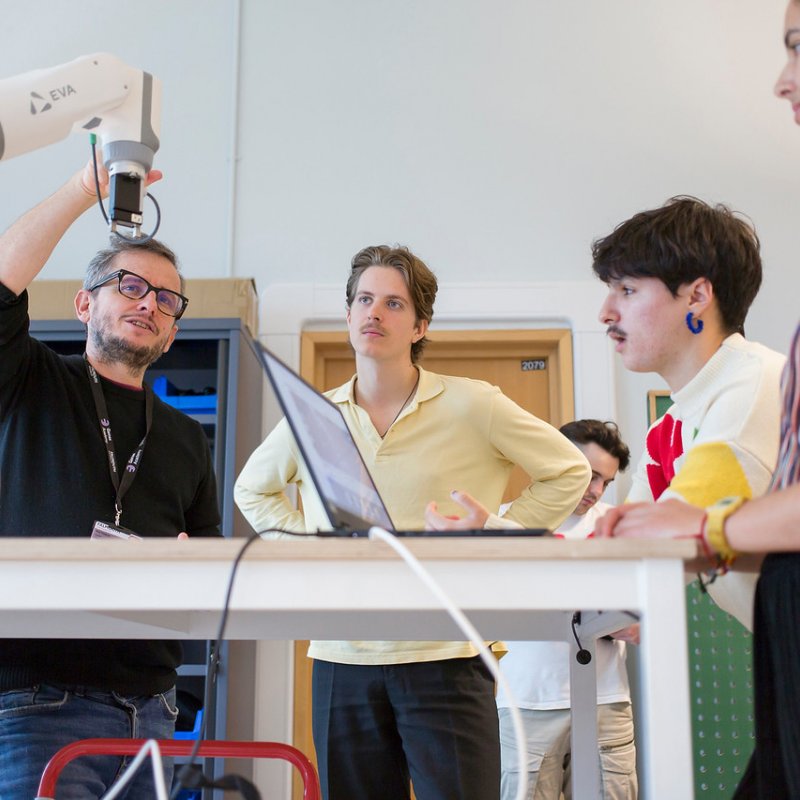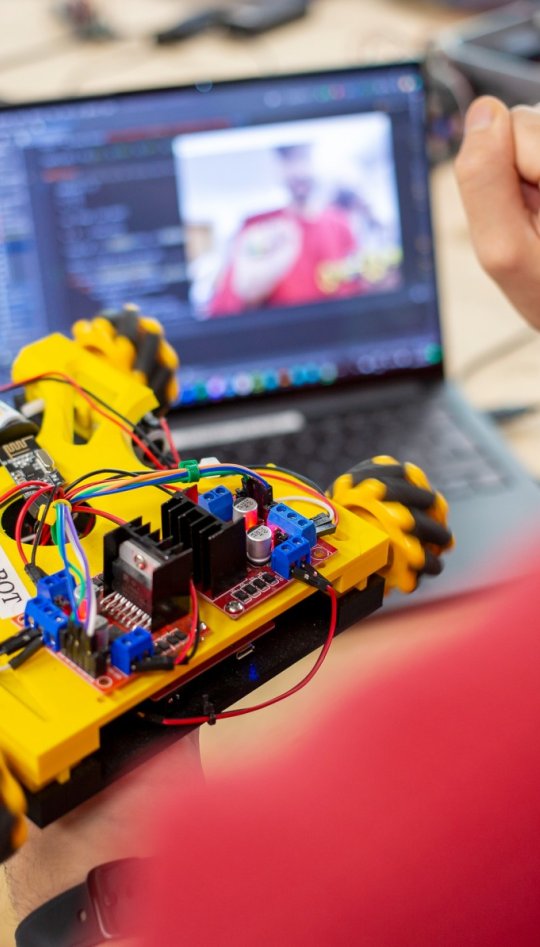

Robotics BSc(Hons)
Develop impactful robotic solutions to real-world challenges.
Course overview
Innovations in robotics are rapidly altering the way we interact in the world. On this Robotics BSc degree, you’ll gain the skills and experiences to influence the future of the industry. From developing control systems for a new generation of sustainable power production to devising animatronic systems for prosthetics, you’ll harness creativity and cutting-edge technologies to create robotic solutions for real-world challenges. Through collaborative projects, you’ll build a specialist knowledge of cybernetics, machine learning, artificial intelligence and human-robot interactions, as well as developing prototyping and fabrication skills.
Why study this course at Falmouth?
- You’ll take a hands-on approach, working collaboratively on practical problems in a bespoke robotics lab and obtaining a mastery of programming, electronics and physical fabrication
- You’ll work collaboratively with other students to devise robotic solutions for a range of real-world challenges and have opportunities to develop vital professional practice experience by tackling live industry projects
- You’ll develop an understanding of the societal, ethical and environmental contexts for robotics and the implications for the design, engineering, deployment and adoption of robotic technologies
- Based in the Games Academy, you’ll have opportunities to explore how robotics can be used to enhance entertainment systems, from creating social robots to developing prototypes for the future of game controllers and other interfaces
- Cornwall is home to world-beating robotics, games and AI companies, environmental technology startups and groundbreaking marine research
Course details
On this Robotics degree, we’ll provide you with exciting opportunities to bring your ideas to life by designing engaging human-robot interactions and working prototypes. Through our industry connections, you’ll get to work on live professional briefs that could range from developing humanoid robots to sensory toys to engage disabled children, animatronic systems for prosthetics, as well as control systems for sustainable power production.
This practical experience is underpinned by explorations into the history of computing, the moral and legal considerations within digital creativity, accessibility and sustainability.
Course study options
You can gain your Robotics BSc(Hons) degree in three years or choose to add a professional placement year. Discover the full course details for each study option, below.
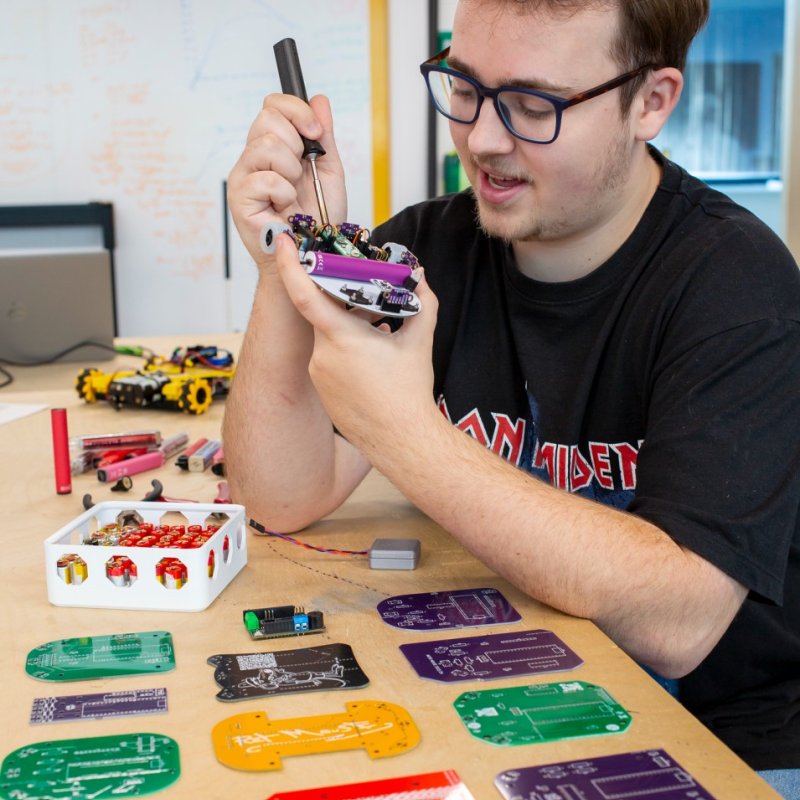

A level playing field
All the courses in the computing subject area share a common first year. No matter your background or experience, in this year you’ll level-up your knowledge of computational science and mathematics through playful experimentation in collaboration with other students.
In the first year of this Robotics degree, you’ll learn the foundations of the discipline. You’ll gain a practical introduction to programming and computer technology as well as learning about the various branches of computer science and the pipelines and processes used to create engaging digital products and services. Finally, you’ll explore approaches to physical computing and build your own autonomous robot.
Modules
Principles of Computing
In this module, you’ll learn the principles of computing, discrete mathematics, statistics and technical communication. Through a series of tasks, you’ll begin to use core computer science concepts, techniques and methods to solve practical problems and leverage algorithms in your solutions.
You'll also delve into the history of computing, engaging with the plurality of voices in the profession and the controversies evoked by algorithmic bias.
Digital Creativity
On this module, you will explore digital media formats including text, image and sound.
You’ll play, tinker, experiment with and extend digital artefacts, transforming what already exists in one form into another form as a means of appropriation. You will then integrate your digital artefacts with digital game technologies, notably game engines, to make them interactive in some way.
You’ll also consider moral and legal questions surrounding digital creativity, such as plagiarism, intellectual property law, licensing rights, representation and media literacy.
Development Foundations
On this module, you’ll gain foundational experience of the basic principles, terminology, roles and tools used in the development of digital products and services.
Through several small-scale team projects, you’ll practice a range of prototyping methods and pitch your idea for a future project. These projects will help you to develop your project management skills, while building a professional, inclusive and supportive studio culture.
Data Fundamentals
In this module, you’ll learn the fundamentals of the data science life cycle. This will include learning how to formulate questions, collect and clean data, explore and visualise data, make statistical inferences and predictions, and report insights in a way that informs decision making.
You'll also gain an awareness of the responsibilities, obligations and legalities of working with sensitive and personal data, including its collection, storage, analysis, management and transmission.
Individual Programming Project
In this module, you’ll refine your approach to computer programming by developing an architecturally sound project focused on object-orientated solutions.
Through this project, you’ll build your confidence with various interfaces that enable interaction within and across different system components. You’ll practice more disciplined software engineering methodologies, develop your mastery of the notations for describing and refactoring system architectures, and apply the mathematics associated with circuit design.
You’ll also gain a greater awareness of ethical considerations such as safety, accessibility, sustainability and the impact of supply chains.
Multidisciplinary Teamwork
On this module, you’ll work in multi-skilled teams to make a digital product or service in response to a prompt or brief.
This work will give you the opportunity to increase your knowledge of organising and managing a software development project. Working in a multidisciplinary team will also give you hands-on experience of the full systems development lifecycle and production pipelines in an ‘agile’ context commonly used in professional practice.
By the end of the module, you and your team should have produced and evaluated a modest but functional proof of concept.
In your second year, you’ll start to focus on your subject specialism. You'll develop your knowledge of embedded systems through simple robot construction, explore the principles of cybernetics and autonomous robotics, and enhance your computational mathematics skills. You’ll also learn the theory and design techniques required to build complex mechanisms to specifications, informed by physics and kinematics, and engage in digital prototyping.
Modules
Computational Mathematics
You’ll learn key mathematic principles, such as linear algebra, geometry, trigonometry, 3D transformation and calculus that underpins computing. You’ll then apply these principles to your own technical working practices.
You’ll also explore the relationship between computational mathematics and cybersecurity. By exploring security topics such as common threats and attack vectors, cryptography and steganography, certification and malware, you’ll learn to programme defensively.
Digital Prototyping
You'll develop your 3D CAD skills through the production of digital prototypes using CNC milling and 3D printing technologies. Exploring the evolution of 3D CAD software as a collaborative designing tool for remote teams, you’ll practice new skills working with cloud-based data and simulation technologies.
Robotics & Cybernetics
In this module, you’ll develop your practical skills in robotics and embedded systems by building a simple robot from a kit of parts using principles from cybernetics and autonomous robotics.
Through the project, you’ll learn advanced electronics theory and design techniques, develop your embedded software programming skills and become able to implement different behaviours based on sensor readings and actuator control.
You’ll also have the opportunity to explore how artificial intelligence is applied in robotics, and examine the role of ethics in self-regulating cybernetic systems.
Algorithms & Optimisation
Throughout this module, you’ll practice and develop your computing skills with a focus on the design and analysis of algorithms.
You’ll explore strategies for creating efficient and optimised code; learning to apply methods of profiling and resource management. You’ll also be challenged to consider sustainability as a theme for your optimisations, with attention to maximising the use and/or extending the lifecycle of hardware that is difficult to recycle.
Robot Design
In this module, you’ll apply critical thinking, creative problem solving, simulation techniques and rapid prototyping methods to an industry-led challenge. You’ll carry out initial research based on the requirements of the brief and propose a potential solution articulated through visualisations created using computer aided design (CAD) and simulation tools.
The proposed solution and specification will be subject to review, prior to fabrication and assembly, after which you will build a robot prototype. This will involve considering the sustainability of materials and supply chains during the fabrication process. You will also need to demonstrate an awareness of the ethics of automated systems with specific reference to their form and function.
Artificial Intelligence and Machine Learning
In this module, you’ll explore the challenges and opportunities of artificial intelligence and machine learning techniques. Considering real-world applications, you’ll conduct a practical research and development project looking to address a specific brief or challenge.
Through this work, you’ll get a chance to think about the legal, social, ethical, professional and sustainability implications of AI technologies. You’ll also examine how artificial intelligence and machine learning may impact computer technology and your future career aspirations.
You can choose to take an optional professional placement year after your second year on a three-year programme, or after your third year if you’re studying for a degree with an Integrated Foundation Year.
You’ll be responsible for finding your own placement, with support from the Employability team.
Choosing this option will enhance your industry experience and skills while studying.
How you’ll study during your professional placement year
You’ll spend time working in a professional context, as part of a business or organisation. This can be in one role, or up to three, and must be for a minimum of 24 weeks.
You’ll develop in-demand workplace skills, deepen your insight into industry and grow your network of contacts, all of which could help you get ahead in your career after graduation.
Throughout this year, you’ll develop a portfolio of work that includes critical self-reflection on what has been learned from the experience. You’ll be required to evidence your experiences, the skills you’ve learned and your professional growth.
In the final year of your Robotics degree, you’ll develop greater intellectual freedom. You'll produce an individual Research & Development project under the supervision of a subject-matter expert and work in a multi-skilled team to design and implement a potentially innovative product or service.
You’ll also enhance your collaborative working skills by tackling “challenge briefs” with students across the university, and learn vital professional practice skills in our Future Skills module.
Modules
Research & Development: Proposal
In this module, you’ll plan and commence an individual ‘major’ research and development project in computing. You can choose to conduct primary research centred on or supported by a novel computing artefact, or practice-based research with significant technical depth.
The development of your written proposal will include identifying an opportunity, critically reviewing relevant literature, setting a hypothesis and designing a mode of data collection, while considering all ethical implications, as well as prototyping a novel and substantial computing artefact.
Future Skills
Focusing on employability, you’ll develop a commercial awareness and entrepreneurial mindset.
You’ll explore career options, including researching the skills required to set up your own business, establish yourself as a freelancer, or for use as an employee in a business or organisation.
You'll also devise a group project proposal around enterprise opportunities. Practical learning will be consolidated through critical reflection as you develop the ability to translate skills for an external challenge-led context.
Human-Robot Interaction
In this module, you’ll develop your hardware design and software engineering skills with particular attention to usability and interaction quality.
You’ll research the core principles of human-robot interaction, applying them to the design and prototyping of social robots based on systems of microcontrollers, sensors and actuators. You'll then use them to explore different methods of interaction with an audience.
Research & Development: Dissertation
On this module, you’ll continue your individual ‘major’ research and development project. Building upon the proposal you submitted, you’ll further develop your prototype computing artefact into a potentially deployable solution. In doing so, you’ll deepen your knowledge of software engineering, the use of advanced research tools, technical writing and academic conventions, as well as the interpretation and visualisation of results from statistical analyses of quantitative data.
Under the supervision of a subject-matter expert, you will: realise a novel and substantial computing artefact; execute your research and development; and critically analyse your results, disseminating your findings through a written academic dissertation. You’ll also present your insights to peers alongside a demonstration of the final computing artefact, referring to the potential impact of your project, any ethical concerns, and potential future work.
Major Collaboration
In this module, you’ll leverage your experiences from the prior stages of the course to deliver a substantial collaborative project. You’ll work in a multi-skilled team to design and implement a potentially innovative product or service.
Typically, this will be the continuation of your previous project, but it could also be a newly proposed project that satisfies a real need, a response to a market opportunity identified by the University, a live brief from or collaboration with industry partners or research teams, or a solution to a problem presented by an external stakeholder.
You will continue to put into practice the ethically-informed methodologies you have outlined in previous modules. Contexts can also vary but could include: enterprise solutions; mobile apps; installations; games; web applications; robots; immersive experiences; software development tools; and more.
As part of our process of continuous improvement, we routinely review course content to ensure that all our students benefit from a high-quality and rewarding academic experience. As such, there may be some changes made to your course which are not immediately reflected in the content displayed on our website. Any students affected will be informed of any changes made directly.
We're an Educational Affiliate of the British Computer Society
The Games Academy is an affiliate of the British Computer Society (BCS), the Chartered Institute for IT. This means our computing qualifications are continually reviewed and updated to meet the needs and demands of the future workforce.
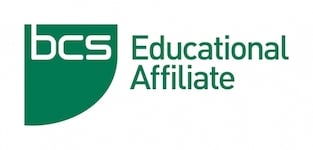
How you'll learn & be assessed
You'll develop the technical skills and creative flair needed to produce social and creative robots through a blend of lectures, seminars, practical workshops, tutorials, crit sessions with your peers, and the opportunity to work on live industry briefs. You'll also have access to our year-round programme of inspiring guest speakers.
At Falmouth, we use a 'digitally enhanced learning & teaching' approach. Your experience will always be predominantly in-person, including seminars, tutorials and studio teaching, with some, more targeted elements, being online either live (synchronous) or pre-recorded (asynchronous). You can read more here.
100% of your assessments will be by coursework.
Assessment methods
Assessments could include:
- Foundation year assessments are 100% coursework based
- Projects
- Papers
- Pitches
- Portfolios
Designed to mirror industry practice, students are also continually assessed on group projects through a group working strategy.
Facilities
- Fabrication equipment including 3D printers, laser cutters, soldering stations, CAD tools and CNC machines
- Specialised computing hardware for game development, deep learning projects and motion capture
- Immersive lab for virtual and mixed reality experiences
- Standard packages used in software development for the creative industries, including Adobe and Autodesk suites
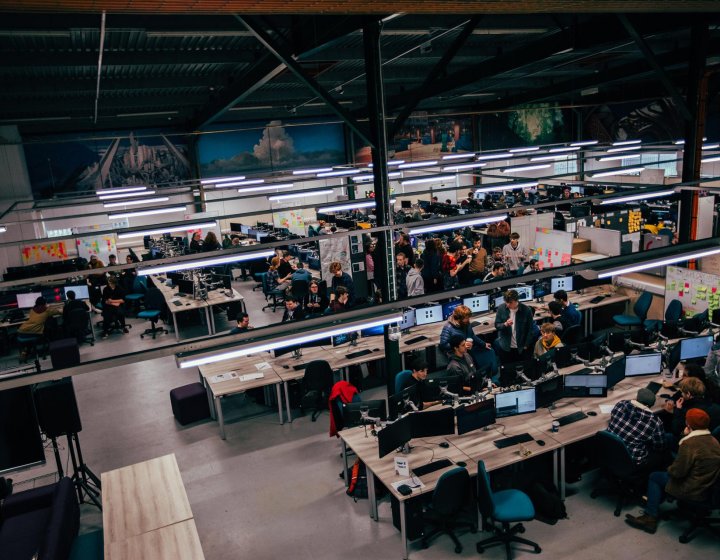
Games Academy Facilities
Our Games Academy offers professional-standard studios, a dedicated craft room, breakout spaces, and...
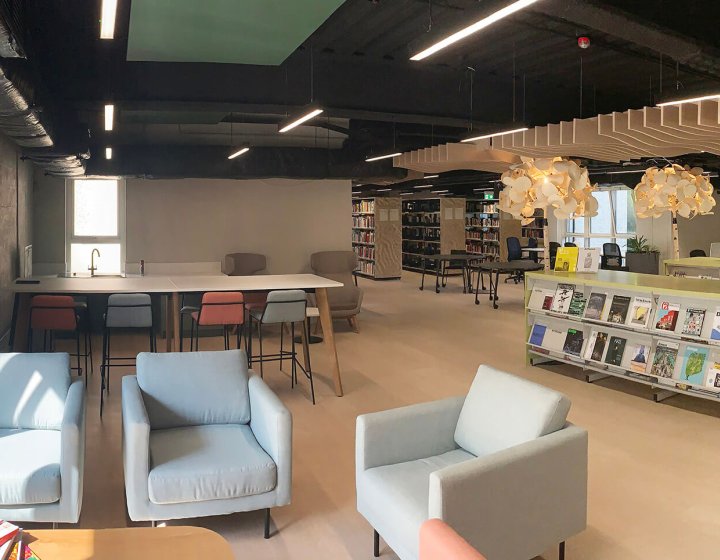
Library Facilities
Offering extensive collections, our two libraries provide a wealth of digital resources, magazines, ...

Sports Centre
Our Sports Centre, on Penryn Campus, includes a spacious gym with up to 90 of the latest, new statio...
'This degree will equip you with the knowledge and skills to explore new challenges and creative opportunities for the robotics industry, by taking a distinctive humanistic approach.'
- Matt Watkins, Robotics lecturer
Staff
You'll learn from staff with industry and world-leading academic experience in a whole range of fields including artificial intelligence, web technologies, game development, digital art, robotics, physical computing, embedded systems and Internet of Things.
Some members of staff only teach on specific modules, and your course might not feature every staff member who teaches on the course.

Matt Watkins
Lecturer in Computing
Matt is an artist, lecturer, developer and designer. He has been responsible for the visual and tech...

Andy Smith
Technical Manager/Technical Tutor
Andy joined Falmouth University in 2013 after completing his undergraduate studies in Communication ...

Joseph Walton-Rivers
Lecturer
Joseph Walton-Rivers is a lecturer in the Games Academy. He joined the university in 2020 to lecture...

Benjamin Green
Lecturer, Robotics BSc(Hons)
After recieving a masters in Robotics Engineering from Plymouth University, I have worked on a varie...

Got a question about this course?
If you want to know more about the course structure, our application requirements or what our graduates have gone on to achieve, our friendly course team is here to help.
Chat to Joseph
Stories from our community
Explore student projects, graduate successes, staff news and industry insights

Game artist Nate Bedford on creating unique characters
14 April 2025
Whether sketching strangers in cafés or dreaming up fantasy worlds, Game Art BA(Hons) alumni Nate B...

Building blockbuster games from Penryn: The Cornishman working on Atomfall
28 March 2025
Ross Everson always knew he wanted to make games — but his journey into making some of the gaming...

Falmouth’s Games Academy rises to 13th in The Princeton Review's global game design rankings
26 March 2025
Falmouth University’s Games Academy has once again been recognised as one of the world’s top ins...

Chris Copeland: Life as a Technical Artist
25 March 2025
Graduate Chris Copeland has embraced change since completing the Game Development: Art course. After...

Cyclaport: The UX Project designed to help Brussels’ Cyclists
19 March 2025
After starting her career as an illustrator, Sarah quickly became drawn to the fast-evolving world o...

Illustration graduate redraws future in games industry
14 March 2025
Originally enrolled in Falmouth’s Illustration BA(Hons) course, Thomas soon realised that his pass...

Exploring the Future of Gaming with Ryan Norrington
14 March 2025
We’re excited to welcome Ryan Norrington, Creative Director at Metavision, as a guest speaker for ...

“Making games isn’t an impenetrable field for a select few,” says lecturer Adam Clewes-Boyne
04 March 2025
Indie Game Development MA (Online) lecturer Adam Clewes-Boyne went from not knowing that a career in...

“You won’t be shy of things to do as a UX designer” says lecturer Jason Haritou
04 March 2025
User Experience Design MA (Online) lecturer Jason Haritou has many strings to his bow. Beginning his...
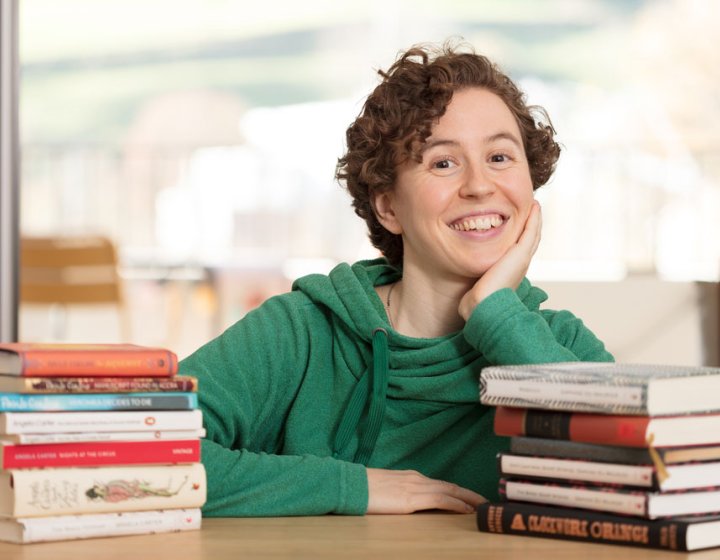
Hannah Cattanach: From architect to UX Designer
23 January 2025
It was late 2022 when Hannah decided to trade in her career as an architect to embark on a new chall...

Falmouth Robotics students build unique panto prop
20 January 2025
Robotics BA(Hons) students Amy While and Maya Rogers recently worked on a custom conveyor belt for u...

Scratching the creative itch: lecturer Joe Kennett’s path in indie games
20 December 2024
It’s been a busy year for Joe Kennett. 2024 has seen him take on a new role as lecturer on Falmout...

Work by Nathan Bedford
A guide to Worldbuilding
31 October 2024
Worldbuilding shapes the sights, sounds, and experiences that draw audiences into a new universe. Bu...

Three scary releases from the Games Academy this Halloween
24 October 2024
At Falmouth, Halloween isn’t just about scary movies and pumpkin carving; it’s also about sampli...

"Failure is a good thing," says Indie Game Development MA (Online) graduate
21 October 2024
Since starting his undergraduate degree at Falmouth in 2019, and through to completing his online In...

Falmouth Alumni Studio 316 Unveil New Game: Post Apocalypse Courier Service
11 October 2024
Studio 316, a game development studio founded by graduates of the Games Academy via Launchpad, has a...

Falmouth Alumni releases new adventure game on Steam
04 October 2024
Three former Games Academy graduates have released their first game, Leximan, from their game studio...
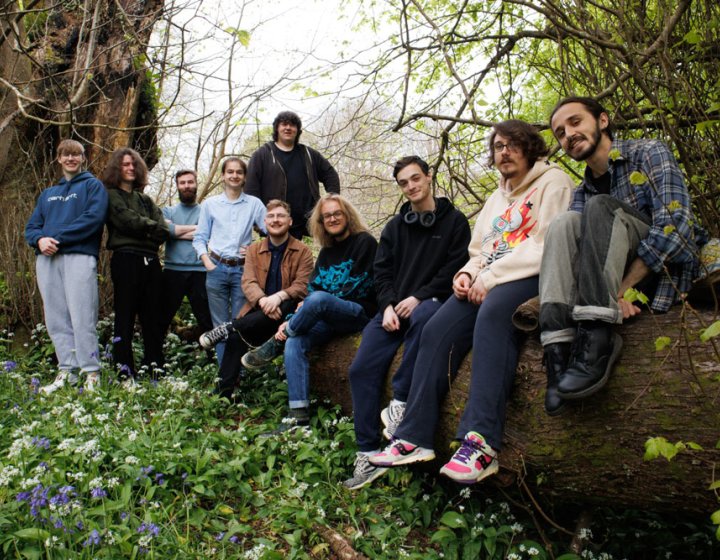
Students get their game featured by The Rookies
08 August 2024
Eleven Games Academy graduates have gained recognition for their new game, Petal, from the industry ...
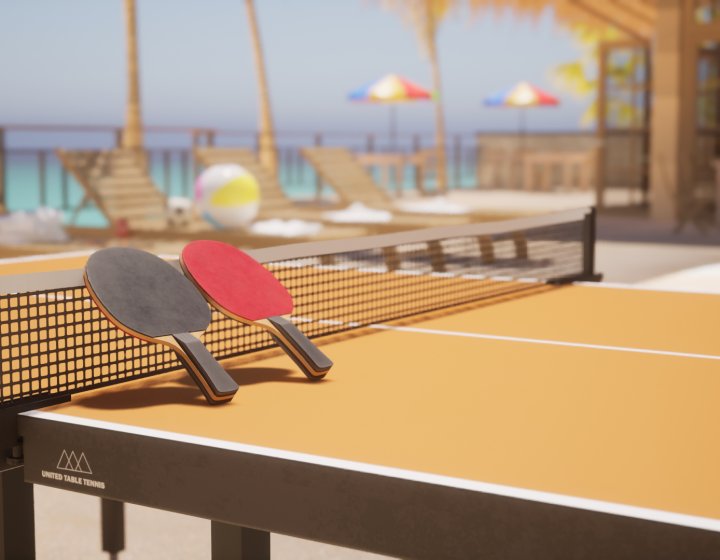
Games Academy alumni release their latest game on Nintendo Switch
07 June 2024
Studio 316, a Cornwall-based games studio which comprises of five former Falmouth University Games A...

Dr Tony Pellicone: my top five favourite games
10 April 2024
One of the simplest joys of loving games is talking about your favourite games – the ones that sta...
Careers
As a Robotics graduate you could become:
- Roboticist
- Data Processing Engineer
- Special Purpose Machinery Designer
- Mechanoid Assembler
- Robot Technician
- Human-Robot Interaction Specialist
- Machine Learning Specialist
- AI Specialist
- Technology Entrepreneur
- Interactive Artist
- Animatronics Technician
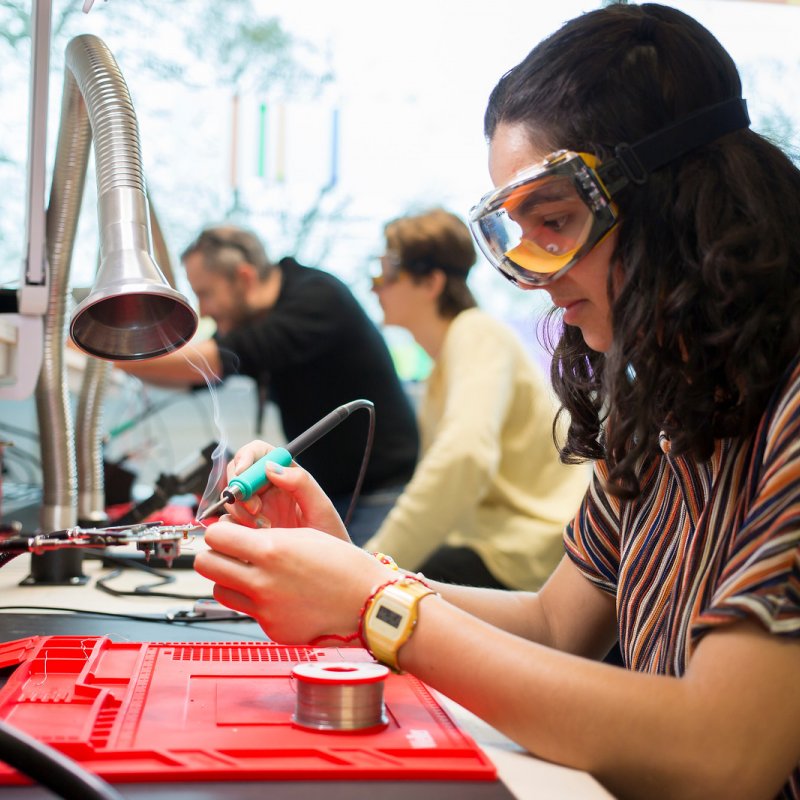
Studying a degree in Computing or Games will open doors for an exciting and potentially lucrative career in a variety of industries.
How to apply
Ready to apply for 2025?
You can apply for our undergraduate degrees via UCAS. You'll need our university UCAS code (F33) as well as your course code (which you'll find on your course page) for your application.
| Course route | UCAS code |
|---|---|
| Robotics BSc(Hons) three year degree | I490 |
| Robotics BSc(Hons) with professional placement | I491 |

Application advice & interview information
Go to ToolkitFor starting your studies in 2025
UK applications: 29 January 2025 (for equal consideration)
Applications after the 29 January will be considered on a first-come, first-served as long as there are places available. Apply for this course now.
International fee payers
International fee payers can apply throughout the year. But we recommend applying as early as possible, to make time for visa and travel arrangements.
We consider all applications on their own individual merit and potential. We invite all applicants to an interview day or audition to give them the opportunity to demonstrate this along with what inspires and motivates them in their field. Applicants will also be able to show their portfolio or give a performance depending on the course. We welcome applications from all subject backgrounds, whether you've specialised in STEM, the arts or humanities.
| Course route | Entry requirements |
|---|---|
| BSc(Hons) three year degree |
104 – 120 UCAS Tariff points GCSE Mathematics Grade 4 (C) |
| BSc(Hons) four year degree with professional placement |
104 – 120 UCAS Tariff points GCSE Mathematics Grade 4 (C) |
UCAS Tariff points will primarily be from Level 3 qualifications such as but not limited to A-levels, T Levels, a BTEC/UAL Extended Diploma or a Foundation Diploma. Applicants should have GCSE Mathematics Grade 4 (C), or equivalent.
For applicants whose first language is English we require you to have or be working towards GCSE English Language Grade 4 (C), or equivalent.
If English is not your first language you will need to meet the same standard which is equivalent to the IELTS Academic 6.0 overall score, with at least 5.5 in Reading, Writing, Speaking and Listening. We accept a range of in country equivalencies and approved tests.
If you need a student visa to study in the UK, you may need to take a recognised language test. You can read our English Language Requirements for more information.
Fees, costs & funding
Tuition fees
| Annual tuition fee | Student |
|---|---|
| £9,535 per year | Full-time UK |
| £17,950 per year | Full-time EU/international |
| £1,905 per professional placement year | Full-time UK and EU/international |
| Annual tuition fee | Student |
|---|---|
| £9,250 per year | Full-time UK |
| £17,950 per year | Full-time EU/international |
| £1,850 per professional placement year | Full-time UK and EU/international |
Tuition fees for September 2026 will be confirmed in summer 2025.
Tuition fees are set annually and are subject to review each year. The University may therefore raise tuition fees in the second or subsequent years of a course, in line with inflation and/or the maximum permitted by law or Government policy. Students will be notified of any changes as soon as possible.
The figures above don't include accommodation and living costs
Typical course costs
- To complete your coursework, you'll require a laptop at an expense of around £1,500. Read about the latest laptop specifications we recommend
- £150 - Recommended reading
- £100 - £220 – Recurring annual cost (robotics parts)
- £30-£150 for a headset with a microphone
- £25-£100 for a webcam
- Internet access with at least 5Mbps speed to enable livestreaming of content
Any materials or equipment you’ll need for your course will be outlined in your Welcome Letter.
Funding
For information about funding available, please visit our student funding pages.
Ask a student
What better way to find out about life at Falmouth University than by asking our current students?
From course details and academic support, to the social scene and settling in, our students are ready and available to answer any questions you might have. Simply set up your account, send them a question and they'll get back to you within 24 hours.
Similar courses
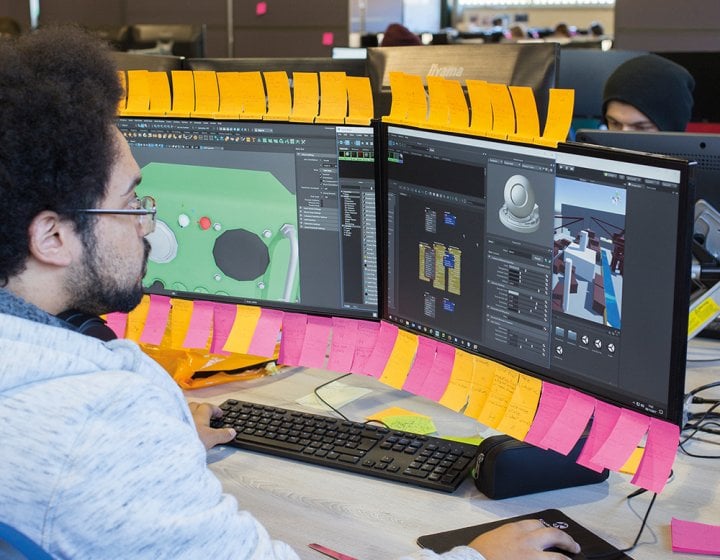
Game Animation BA(Hons)
Gain experience of working to a real-time animation pipeline and graduate with a rich portfolio of w...
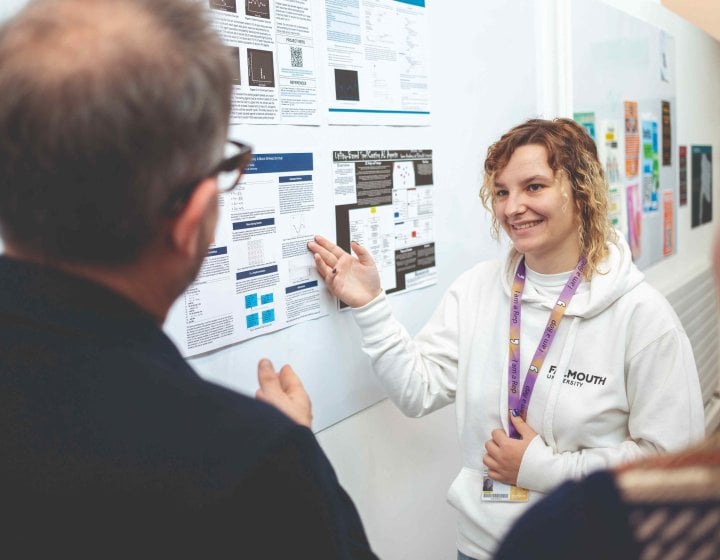
Computer Science BSc(Hons)
New immersive realities, data-rich interactions, automations and ever-more ubiquitous systems are sh...
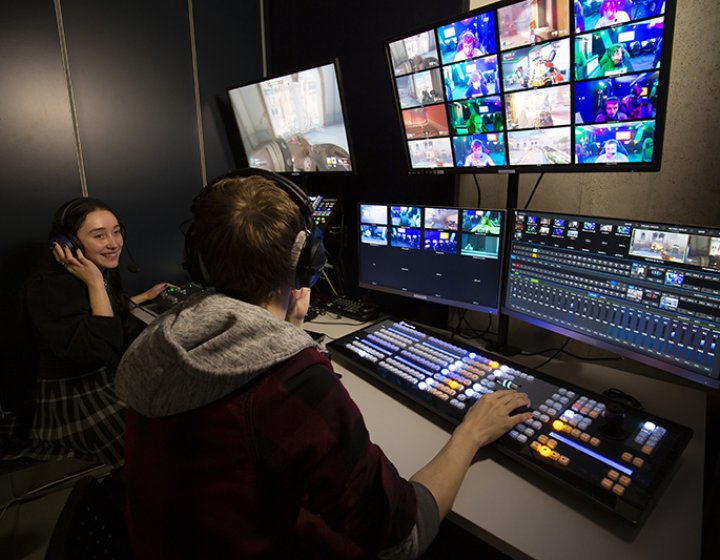
Esports & Livestreaming BA(Hons)
Immerse yourself in Esports culture on this degree, which offers a unique opportunity to be at the f...
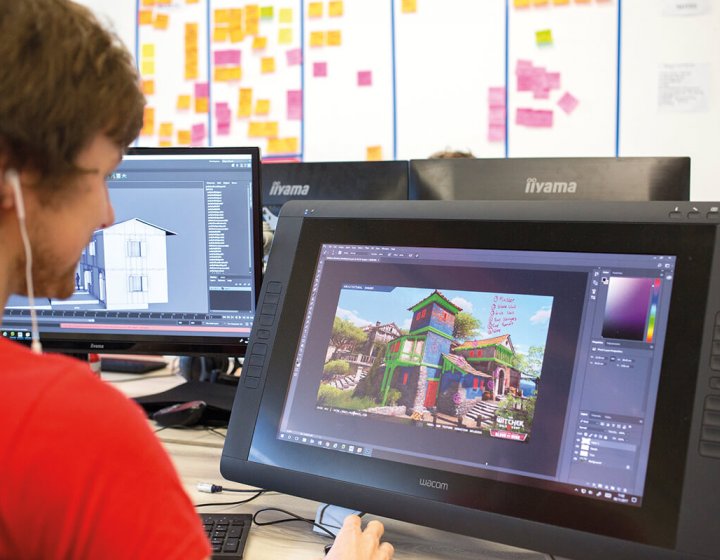
Game Development BA(Hons)
Join a community of people who have a passion for games. From day one, you’ll work as you would wi...
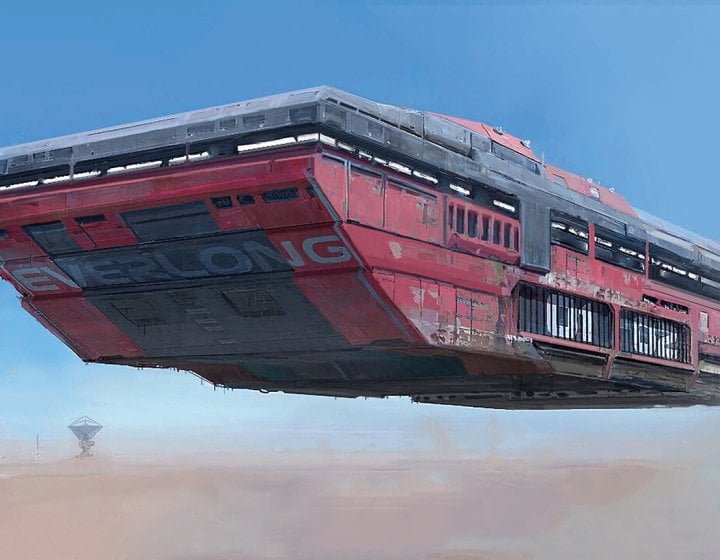
Game Art BA(Hons)
Work in multi-skilled collaborative teams and graduate as a confident, industry-ready game artist. ...
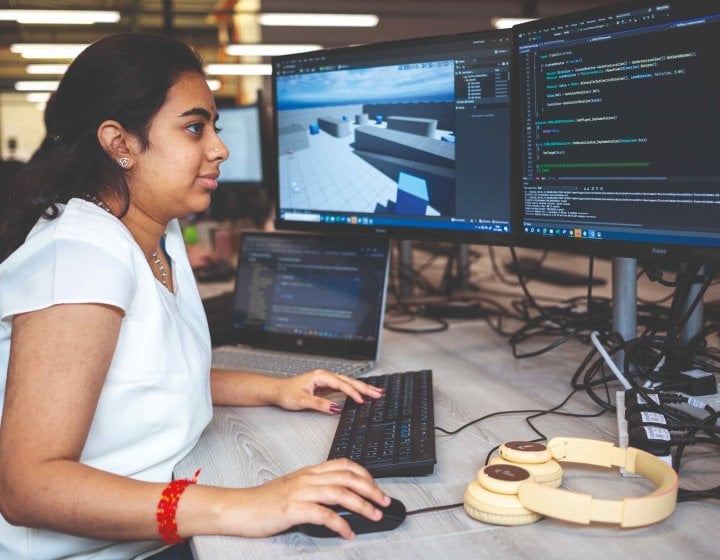
Computing for Games BSc(Hons)
Learn how to shape the games of the future by studying game development through the lens of computer...
Open Days and events
From visiting campus to online application advice, get all the information you need about joining our creative community.
Find an event









